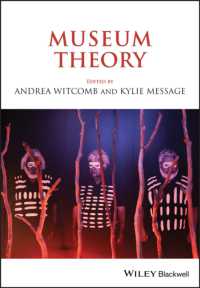Full Description
A foundational text of twenty-first-century rhetorical studies, Vernacular Voices addresses the role of citizen voices in steering a democracy through an examination of the rhetoric of publics. Gerard A. Hauser maintains that the interaction between everyday and official discourse discloses how active members of a complex society discover and clarify their shared interests and engage in exchanges that shape their opinions on issues of common interest.In the two decades since Vernacular Voices was first published, much has changed: in the aftermath of the 9/11 terrorist attacks, US presidents have increasingly taken unilateral power to act; the internet and new media have blossomed; and globalization has raised challenges to the autonomy of nation states. In a new preface, Hauser shows how, in an era of shared, global crises, we understand publics, how public spheres form and function, and the possibilities for vernacular expressions of public opinion lie at the core of lived democracy.
A foreword is provided by Phaedra C. Pezzullo, associate professor of communication at the University of Colorado Boulder.
Contents
Chapter 1 The Public Voice of Vernacular Rhetoric Rhetoric's Place in the Athenian DemocracyCivil Society and the Appearance of Public OpinionVox Populi and the Problem of "Public" OpinionRhetorical Antecedents of PublicsConclusion
Chapter 2 Discourse, Rhetorical Discourse, and the Public SphereThe Bourgeois Public SphereRhetorical Counterassumptions to Habermas's ModelConclusion
Chapter 3 Civic Conversation and the Reticulate Public SphereOutline of a Rhetorical Model of the Public SpherePublic Conversation and the Associations of theReticulate Public SphereCommon Meaning and the Associative Networks ofthe Reticulate Public SphereThe Ground of Civil Judgment Rhetorical Criteria of the Public SphereConclusion
Chapter 4 Reading Public Opinion from Vernacular Rhetoric Witnessing Vernacular Discourse: An Outsider's ExperienceVernacular Rhetoric: The Rhetorical Locus of PublicOpinionPublic Opinion and ReasoningPublic Opinion and Common UnderstandingThe Dialogical Process of Opinion FormationConclusion
Chapter 5 Narrative, Cultural Memory, and the Appropriation of Historicity Rhetoric and the Active SocietyMemories of Hope: PolandMemories of Despair: YugoslaviaContrasting Stories, Contrasting PossibilitiesConclusion: The Narrative Bridge from Tradition toHistoricity
Chapter 6 Reshaping Publics and Public Spheres: The Meese Commission's Report on PornographyA Call to Reshape the Literary Public SphereThe Final Report: Version IThe Final Report: Version IIReconstructing the Public SphereConclusion
Chapter 7 Technologizing Public Opinion: Opinion Polls, the Iranian Hostages, and the Presidential ElectionThe Problem of Public OpinionTransforming Victims into HeroesPublic Opinion as Technological ConstraintConclusion
Chapter 8 Democracy's Narrative: Living in Roosevelt's AmericaThe Election of 1940The People's Letters and Public Opinion"Public" Opinion on the Third TermDefining AmericaConclusion: Forgotten Publics in a Land of Strangers
Chapter 9 The Rhetoric of Publicness: Theory and MethodTheoretical ConsiderationsMethodological Considerations
Appendix I: Chronology of Hostage Developments
Appendix II: Chronology of the 1980 CampaignNotesBibliographyIndex







